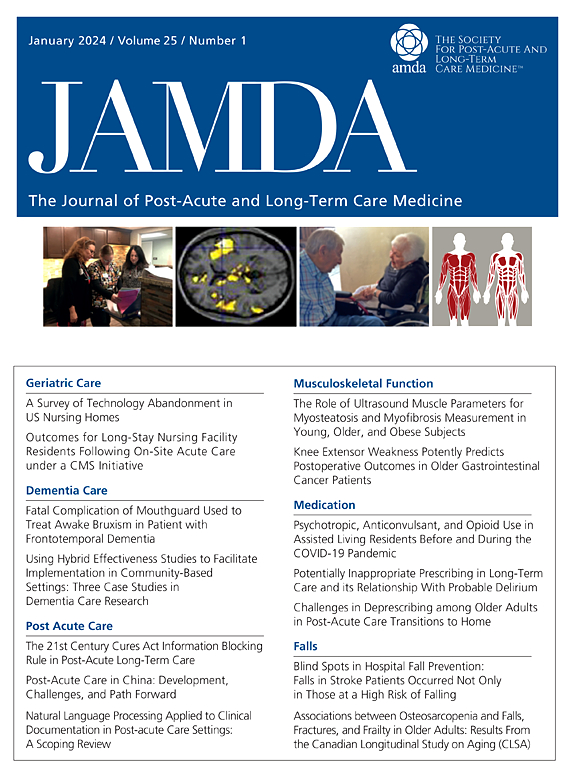Mental Health–Related Quality Indicators for Long-Term Care: A Modified Delphi Consensus Study
IF 4.2
2区 医学
Q2 GERIATRICS & GERONTOLOGY
Journal of the American Medical Directors Association
Pub Date : 2025-07-24
DOI:10.1016/j.jamda.2025.105768
引用次数: 0
Abstract
Objectives
Despite the high prevalence of depression, anxiety, and other mental health conditions in long-term care settings, there are no mental health–related quality indicators mandated for use in Australia. This study aimed to gain national consensus on indicators for inclusion in a mental health benchmarking industry tool for residential aged care.
Design
A modified Delphi study incorporating 2 rounds of online surveys.
Setting and Participants
We invited a panel of clinical, academic, industry, and consumer experts from across Australia.
Methods
Experts were asked to rate 35 potential indicators on a 5-point Likert scale for importance and feasibility. Round 2 included new potential indicators based on qualitative feedback, and merged or reworded indicators that did not previously achieve consensus. Indicators with a median rating ≥4 and an interquartile range ≤1 for importance were deemed acceptable. Additional steering group meetings were held between rounds, for decision-making purposes.
Results
Rounds 1 and 2 were completed by 49 and 34 experts, respectively. Twenty-seven indicators achieved consensus of agreement for inclusion on importance, with good to excellent item content validity. These included 6 items relating to assessment, 7 items relating to management, 4 items relating to resources, 5 items relating to staff training, and 5 items relating to resident outcomes. Although these indicators also rated highly on feasibility, there was mixed consensus as measured by an interquartile range >1. Qualitative feedback suggests that the indicators are comprehensive, important, and valuable.
Conclusions and Implications
Findings provide consensus on a mix of structure (staff training and resources), process (assessment and management), and resident outcome quality indicators. Future research will focus on pilot testing the indicators in residential aged care homes, to ensure and optimize feasibility, reliability, acceptability, and case-mix adjustment considerations. The mental health benchmarking tool has the potential to drive mental health care improvements at both a care home and industry level, in Australia and globally.
长期照护的心理健康品质指标:修正的德尔菲共识研究。
目标:尽管在长期护理环境中,抑郁、焦虑和其他精神健康状况的发病率很高,但澳大利亚没有强制性使用与精神健康有关的质量指标。本研究的目的是获得全国共识的指标,包括心理健康基准行业工具的住宅养老。设计:一个改进的德尔菲研究,包括两轮在线调查。环境和参与者:我们邀请了来自澳大利亚各地的临床、学术、工业和消费者专家组成的小组。方法:请专家对35个潜在指标进行重要性和可行性的5分李克特评分。第二轮包括基于定性反馈的新的潜在指标,并合并或改写以前未达成共识的指标。中位数评分≥4且重要性四分位数范围≤1的指标被认为是可接受的。为了决策目的,在各轮之间还举行了指导小组会议。结果:第1轮和第2轮分别有49位和34位专家完成。27个指标在纳入重要性方面达成了共识,项目内容效度从好到好。其中6项与评估有关,7项与管理有关,4项与资源有关,5项与工作人员培训有关,5项与住院医师结果有关。尽管这些指标在可行性方面也获得了很高的评价,但从四分位数范围来看,人们的共识不一。定性反馈表明,这些指标是全面的、重要的和有价值的。结论和影响:研究结果就结构(员工培训和资源)、过程(评估和管理)和住院医师结果质量指标的组合达成了共识。未来的研究将侧重于在住宅养老机构中对这些指标进行试点测试,以确保和优化可行性、可靠性、可接受性和病例组合调整考虑。心理健康基准工具有可能在澳大利亚和全球的养老院和行业层面推动心理健康护理的改善。
本文章由计算机程序翻译,如有差异,请以英文原文为准。
求助全文
约1分钟内获得全文
求助全文
来源期刊
CiteScore
11.10
自引率
6.60%
发文量
472
审稿时长
44 days
期刊介绍:
JAMDA, the official journal of AMDA - The Society for Post-Acute and Long-Term Care Medicine, is a leading peer-reviewed publication that offers practical information and research geared towards healthcare professionals in the post-acute and long-term care fields. It is also a valuable resource for policy-makers, organizational leaders, educators, and advocates.
The journal provides essential information for various healthcare professionals such as medical directors, attending physicians, nurses, consultant pharmacists, geriatric psychiatrists, nurse practitioners, physician assistants, physical and occupational therapists, social workers, and others involved in providing, overseeing, and promoting quality

 求助内容:
求助内容: 应助结果提醒方式:
应助结果提醒方式:


